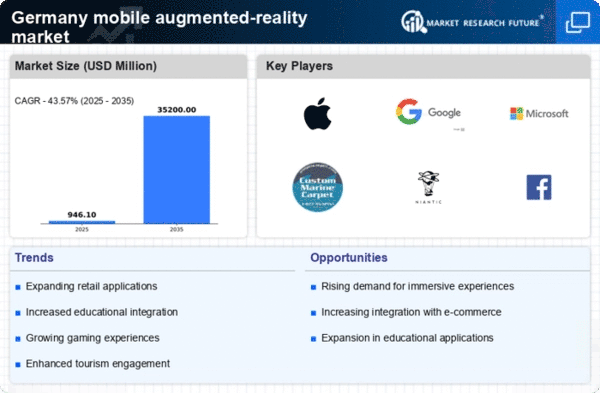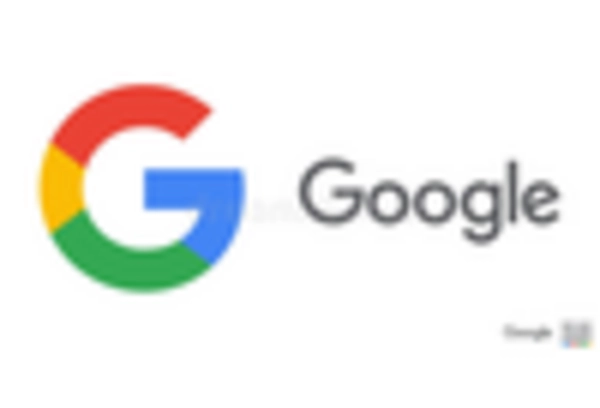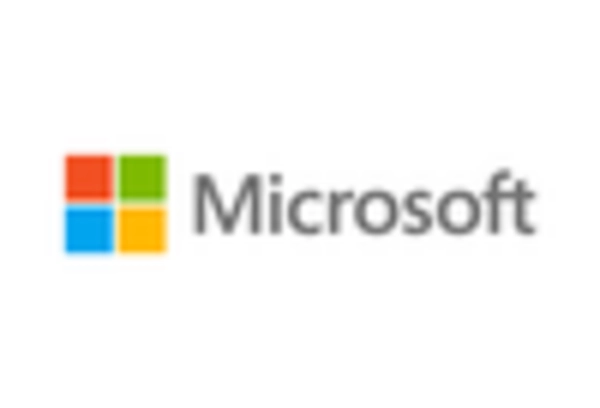Increased Investment in AR Startups
The mobile augmented-reality market is witnessing increased investment in AR startups within Germany. This investment is fostering innovation and development in this sector. Venture capital funding for AR-related companies has surged, with investments reaching approximately €500 million in 2025. This influx of capital is enabling startups to explore new applications and improve existing technologies, thereby enhancing the overall landscape of the mobile augmented-reality market. As these startups develop cutting-edge solutions, they are likely to attract more users and businesses, further driving market growth. The collaborative efforts between established tech companies and emerging startups also indicate a promising future for AR technologies, suggesting that the mobile augmented-reality market will continue to evolve rapidly.
Rise of E-commerce and Online Shopping
The mobile augmented-reality market is poised for growth. This growth is due to the rise of e-commerce and online shopping in Germany. As consumers increasingly turn to digital platforms for their purchasing needs, the integration of AR technologies is enhancing the online shopping experience. By November 2025, it is estimated that over 50% of online retailers in Germany will incorporate AR features, allowing customers to visualize products in their own environment before making a purchase. This capability not only improves customer satisfaction but also reduces return rates, which is a significant concern for e-commerce businesses. The synergy between AR and e-commerce is likely to drive further investment in mobile augmented-reality applications, as retailers seek to capitalize on the benefits of this technology.
Growing Interest in Interactive Marketing
The mobile augmented-reality market is benefiting from a growing interest in interactive marketing strategies among businesses in Germany. Companies are increasingly leveraging AR to create immersive advertising experiences that engage consumers more effectively. As of November 2025, around 60% of marketing professionals in Germany report using AR in their campaigns, reflecting a shift towards more innovative promotional techniques. This trend is particularly evident in sectors such as fashion and automotive, where brands utilize AR to allow customers to visualize products in real-time. The potential for increased customer engagement and higher conversion rates makes AR an attractive option for marketers, suggesting that the mobile augmented-reality market will continue to expand as businesses seek to differentiate themselves in a competitive landscape.
Expansion of AR in Healthcare Applications
The mobile augmented-reality market is expanding into healthcare applications. This expansion is becoming a significant driver of growth in Germany. Medical professionals are increasingly adopting AR technologies for training, surgical planning, and patient education. As of November 2025, approximately 40% of healthcare institutions in Germany are utilizing AR tools to enhance medical procedures and improve patient outcomes. This trend is indicative of the potential for AR to revolutionize the healthcare sector, providing practitioners with real-time data and visualizations during procedures. The integration of AR in healthcare not only improves efficiency but also enhances the quality of care, suggesting that the mobile augmented-reality market will continue to gain traction in this vital industry.
Technological Advancements in Mobile Devices
The mobile augmented-reality market is experiencing a surge due to rapid technological advancements in mobile devices. In Germany, the proliferation of high-performance smartphones equipped with advanced processors and enhanced graphics capabilities is facilitating the development of sophisticated AR applications. As of November 2025, approximately 75% of smartphone users in Germany own devices that support AR functionalities, indicating a robust consumer base for mobile augmented-reality applications. This trend is likely to continue as manufacturers invest in improving hardware specifications, which may further drive the adoption of AR technologies across various sectors, including retail, education, and entertainment. The increasing integration of AR features in mobile operating systems also plays a crucial role in enhancing user experience, thereby propelling the mobile augmented-reality market forward.
















